Building on what works: empowering women through religious community-based associations
Touba, Senegal’s second most densely populated city, offers a compelling illustration of the way that the country is scaling up nutrition through the empowerment of women.
[vc_row row_type=”row” text_align=”left” css_animation=””][vc_column width=”1/2″]
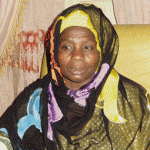
Mrs Sokhna Mame Bousso Mbacke,
Director of the community-based organisation Wilaya in Touba and coordinator of the project Jiggen Ak Domam (“mother-child”) carried out under the National Scaling Up Nutrition Programme[/vc_column_text][/vc_column][vc_column width=”1/2″]
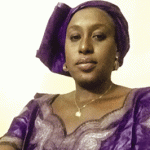
Néné Hawa SY,
Thies Regional Office Executive Head Fight Against Malnutrition Unit (cellule de Lutte Contre la Malnutrition)[/vc_column_text][/vc_column][/vc_row][vc_row row_type=”row” text_align=”left” css_animation=””][vc_column][vc_separator type=”transparent”][/vc_column][/vc_row][vc_row row_type=”row” text_align=”left” css_animation=””][vc_column]
[vc_column_text custom_options=””]“Having a woman leader, who engages broad community participation, is a guarantee of success for actions against
malnutrition”
Mrs Sokhna Mame Bousso Mbacke
[/vc_column_text][/vc_column][/vc_row][vc_row row_type=”row” text_align=”left” css_animation=””][vc_column][vc_separator type=”transparent”][/vc_column][/vc_row][vc_row row_type=”row” text_align=”left” css_animation=””][vc_column][vc_column_text custom_options=””]Touba, Senegal’s second most densely populated city, offers a compelling illustration of the way that the country is scaling up nutrition through the empowerment of women. Touba, often recognized as Senegal’s religious centre, is home to the historic headquarters of the Muslim Mouride brotherhood, the most influential of the four main Muslim brotherhoods in Senegal. In Touba, and most of Senegal, religious and political powers are strongly interconnected. An example of this can be found in the dahira structure which are Mouride religious associations established in urban areas to provide a space for communication and mutual support. Dahiras have historically played an important role in integrating migrants or newcomers from rural areas. The first Mouride dahiras formed in Dakar in the 1940s and continue to play a very prominent role in community life. The dahiras of Touba offer a space for women and girls to actively participate in addressing economic, social and health issues.
Founded in 1987, Wilaya is a community-based structure that has grown to include over 40 dahiras in Touba. From its founding, Wilaya has acted as a forum through which women played leadership roles in implementing hygiene actions and awareness-raising campaigns for health issues. Led by Mrs. Sokhna Mame Bousso Mbacké, Wilaya plays a major role in implementing the activities set out in National Scaling Up Nutrition Programme.
Wilaya is supported by the Fight Against Malnutrition Unit (Cellule de Lutte Contre la Malnutrition), housed
in the Office of the Prime Minister, which coordinates all nutrition relevant projects and oversees the national nutrition policy implementation. Services provided by Wilaya to improve the nutritional status of communities include monitoring children’s weight, acute malnutrition screening, talks and social mobilisation of mothers and other community members, local food processing and availability, motivating community actors through economic activities (fabrics and food trade) and promoting nutrition education in schools. Wilaya
has also been instrumental in establishing a health insurance scheme called Gaindé Fatma that provides
health care to individuals and families at lower cost.[/vc_column_text][/vc_column][/vc_row][vc_row row_type=”row” text_align=”left” css_animation=””][vc_column][vc_separator type=”transparent”][/vc_column][/vc_row][vc_row row_type=”row” text_align=”left” css_animation=””][vc_column]
Collaborative activities organised by the dahira
- Communicate and disseminate key messages about family nutrition and health behaviors
- Nutrition support to vulnerable individuals and households
- Support community nutrition service delivery (mothers and child-care workers’ mobilisation, monitoring children’s weight, acute malnutrition screening, talks, etc.)
Activities in cooperation with other sectors of development:
- Follow-up meetings with the Chamber of Commerce in relation to income-generating activities (local cereals processing and commercialisation; soap production; dyeing; etc.)
- Exchanges with the donor of the Wilaya (COFENAC Bank)
- Strengthening learning among children through the creation of schools
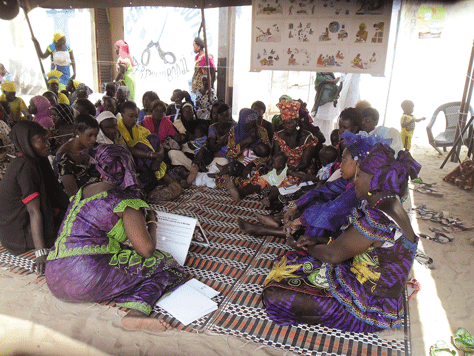
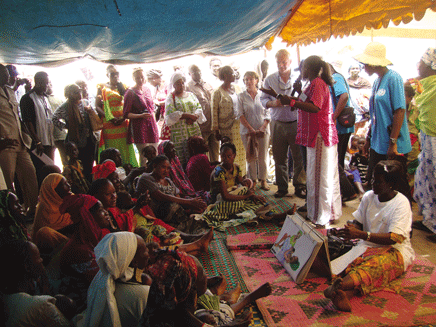 [/vc_column_text][/vc_column][/vc_row][vc_row row_type=”row” text_align=”left” css_animation=””][vc_column][vc_separator type=”transparent”][/vc_column][/vc_row][vc_row row_type=”row” text_align=”left” css_animation=””][vc_column][vc_column_text custom_options=””]Because of the dahiras’ established approaches to community engagement, Wilaya recorded high participation rates for its activities, generating significant results in the adoption of positive nutrition behaviors. The results achieved include:
[/vc_column_text][/vc_column][/vc_row][vc_row row_type=”row” text_align=”left” css_animation=””][vc_column][vc_separator type=”transparent”][/vc_column][/vc_row][vc_row row_type=”row” text_align=”left” css_animation=””][vc_column][vc_column_text custom_options=””]Because of the dahiras’ established approaches to community engagement, Wilaya recorded high participation rates for its activities, generating significant results in the adoption of positive nutrition behaviors. The results achieved include:
- decline of childhood diseases;
- reduction of infant and maternal mortality;
- increasing involvement of women as agents of influence and behavior change;
- husbands’ involvement in scaling up nutrition activities;
- participation in income generating activities.
[/vc_column_text][/vc_column][/vc_row][vc_row row_type=”row” text_align=”left” css_animation=””][vc_column][vc_separator type=”transparent”][/vc_column][/vc_row][vc_row row_type=”row” text_align=”left” css_animation=””][vc_column]
Key Lessons
of the National Scaling Up Nutrition Programme. Empowering women is vital because it allows them to
better strengthen their children’s health. Empowering women on nutrition has helped to:
- consolidate strong community dynamics and engagement
- establish “family attics” (Saxum Njaboot) for cereals storage and preservation in every nutrition community center
- strengthen women’s leadership roles (management committees of the nutrition community centers are chaired by women)
The success of Wilaya in Touba demonstrates the power of the Government of Senegal’s approach. By building on the structures and relationships that exist within communities, participation in activities and uptake of services and interventions that are required for improving nutrition are most likely to increase. Replicating this success requires:
- Mapping existing women’s associations
- Identifying influential women leaders
- Informing decision makers on the National Scaling Up Nutrition Programme objectives
- Establishing management committees whose members are drawn from community-based associations
- Providing training to actors and community stakeholders involved in efforts to address malnutrition
- Elaborating an action plan as well as a monitoring and evaluation process
Women’s Empowerment for improved community nutrition in Lao PDR
Recognising the need to scale up efforts to tackle hunger and malnutrition, development partners have increased their commitment to support the Government of Lao PDR for improved nutrition.
The Scaling Up Nutrition Civil Society Alliance (SUN CSA) in Lao PDR with support from Plan International and the Swiss Development Cooperation (SDC), undertook a study to document examples of successful approaches to improved nutrition implemented in the country that address gender equality or gender mainstreaming. The primary aim of this study has been to inform the National Food and Nutrition Security Action Plan (FNSAP) to strengthen the commitment to gender equality recognising that this is key to improved nutritional outcomes, and inform partners supporting the implementation of the FNSAP on approaches and models that work.
The key interventions that were identified vary across the spectrum of agriculture, livelihoods, and education. Two examples, women’s support groups and gender responsive health systems-strengthening approach are presented below. [/vc_column_text][/vc_column][/vc_row][vc_row row_type=”row” text_align=”left” css_animation=””][vc_column][vc_separator type=”transparent”][/vc_column][/vc_row][vc_row row_type=”row” text_align=”left” css_animation=””][vc_column][vc_column_text custom_options=””]
Women’s Income and Nutrition Groups: by women for women
Women’s Income and Nutrition Groups (WINGs) developed by CARE International and the Lao Women’s Union brings together village women to help them to identify solutions that best respond to their needs. The various activities undertaken by these groups include training in the preparation of nutritious family meals using local and seasonally available foods. This enables women to be able to make decisions on how household
resources are used in order to improve nutrition. While the groups have a focus on nutrition, including how to grow their own food (fish ponds, cropping etc.), they are also encouraged to look at other aspects of their lives that also impact on nutrition such as their workloads, incomes and health.
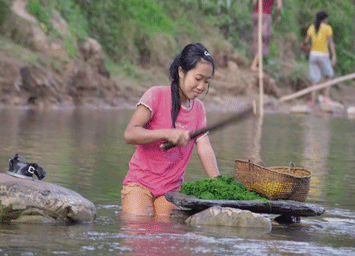
Some WINGS groups have linked women to the District Health Offices (DHO) for access to contraception and child and mother health checks. Others have provided wheelbarrows to reduce women’s workloads, or provided training on coffee growing and processing as a potential income earning opportunity. In all these examples, the women themselves agree on group membership, topics for discussion and what support or technical assistance they will need. [/vc_column_text][/vc_column][/vc_row][vc_row row_type=”row” text_align=”left” css_animation=””][vc_column][vc_separator type=”transparent”][/vc_column][/vc_row][vc_row row_type=”row” text_align=”left” css_animation=””][vc_column][vc_column_text custom_options=””]Recruiting, Training and Supporting Women Health Workers
Save the Children currently supports a health systems-strengthening approach to enable District Health Offices (DHOs) to provide quality health and nutrition services to all villages in their district. To increase access to health care, Save the Children has supported the construction of village clinics, with each clinic serving a cluster of 5-8 villages (about 3-4000 people). Having trained women in health facilities is critical. The DHOs participating in the Primary Health Care Program are encouraged to consider staffing quotas and placement. Now, each health centre has at least one, and often two women staff (out of two or three total staff) working in their health centres, one of which is usually a nurse midwife/skilled birth attendant. Pairing women staff together in health centres provides a more supportive working environment for the women,
and increases the retention rates of trained staff. Having women staff also increases the number of patients to the centres (Save the Children has seen an increase from 200 patients to 2,500 patients over 2-3 years in some centres). Several NGOs support scholarships for women from ethnic communities to study nursing to increase the number of trained female health staff able to speak in local languages. Important to the success of this program is that it operates within the government health system, not apart from it. Save the Children provides skills training, better facilities and equipment. Based on these examples and the other interventions identified in the study, the SUN CSA in Lao have been able to share some insights on the most effective ways to empower women and improve nutrition. These include:
- Use local, ethnic languages when working with non-Lao speaking communities. Organising meetings and trainings in local languages encourages the participation of girls and women.
- Use or develop tools that are suitable for non-literate persons.
- Work at the household and village level is essential. Nutrition is a complex issue that needs to be addressed in homes and communities.
- Build and invest in long-term relationships with communities. Changing behaviors, testing and revising approaches, convincing communities and delivering benefits all take time and require trust.
- Acknowledge and understand the specifics of different communities such as the cultural differences, including language, but also the different roles and responsibilities of men and women, food taboos and practices.
- Incorporate monitoring and evaluation, including feedback and adjustment mechanisms, into programs,
and ensure monitoring and evaluation frameworks fully mainstream gender. - Ensure that additional costs required to address gender equality and to fully mainstream gender are included in the programme budget.
[/vc_column_text][vc_column_text custom_options=””]
Source: Adapted from Women’s Empowerment for Improved Community Nutrition, Scaling Up Nutrition Civil Society Alliance in Lao PDR, 2015.
[/vc_column_text][/vc_column][/vc_row]